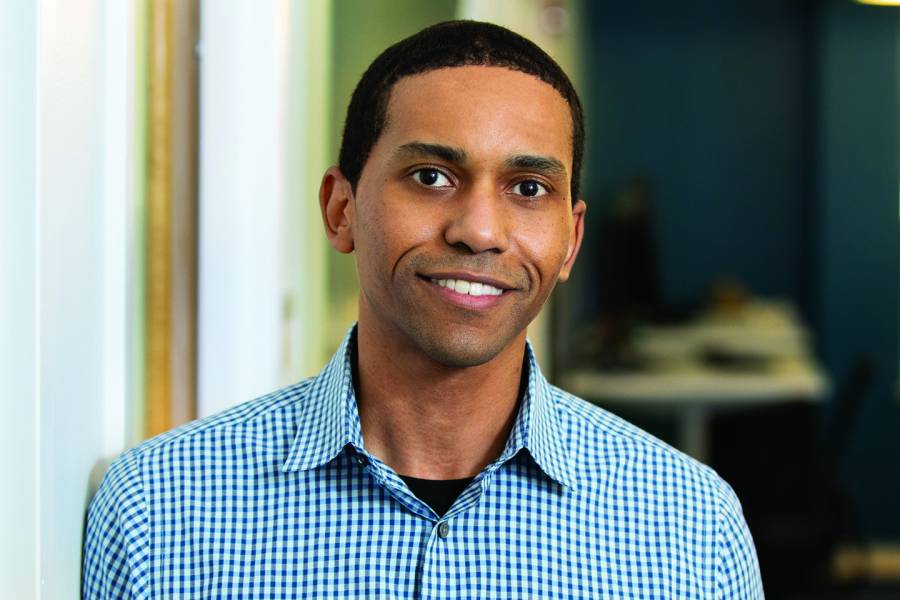Isaac Kinde, Med '15 (MD, PhD), spent years figuring out a way to screen for DNA mutations that may signal the presence of cancer with a high level of accuracy. While in graduate school, he helped invent a biomarker technology called Safe Sequencing System, or SafeSeqS, which reduces the error rate of DNA sequencing. Today, as co-founder and head of research and innovation at Thrive, a biotech startup launched in May 2019 with a $110 million Series A financing, Kinde is working to bring to market the technology he helped invent. Thrive plans to commercialize a liquid biopsy test initially developed by Johns Hopkins researchers called CancerSEEK, which uses SafeSeqS, to help detect cancers earlier through a routine blood draw. Kinde is driven by how to get reliable results in physicians' hands ASAP. He's fueled by his passion for public health, a confidence in Thrive's team of more than 70 people, and a lifelong focus on STEM, which was piqued during his undergraduate studies in the University of Maryland Baltimore County's Meyerhoff Scholars Program. He first heard of the program as a sophomore in high school, when he reached out to a potential mentor before applying for admission.
You knew you wanted to be involved in STEM as a 10th grader?
I knew before then. Maybe it was fifth grade. My dad is a veterinarian, and my mom is a math teacher. My mom encouraged me to get good at math. With my dad there was a really personal experience—I don't know how much detail you want, but I got sick. I had severe diarrhea. My dad took a stool sample from me and took it to his lab. He was able to determine that I did not have a run-of-the-mill infection—I had salmonella. It was pretty cool that my dad was able to figure something out about my health status by taking a sample from me.
Fast forwarding many, many years: The first research project that I did at Johns Hopkins for my PhD was working on a way to detect colon cancer from stool. It was full circle.
Why cancer?
Because it's a big problem. It's an important problem. And it's a problem that I think I can help solve.
Where does that confidence come from? All the great people that I've worked with for so many years. My research advisers are famous for good reason—Bert Vogelstein, Ken Kinzler, Nickolas Papadopoulos, Luis Diaz, and Shibin Zhou. They are world-renowned experts in cancer genetics and therapeutics, and helped create what we now call liquid biopsy tests. Being able to work with the best people in the field and to hear them talk about how we go about saving lives from cancer deaths—it was clear. We have a good plan. The earlier that you detect cancers, the more amenable they are to cure.
Why did you become an entrepreneur?
It's how I thought I could make the biggest impact quickly. I had a pretty singular focus. The opportunity came around the time when I was about to start interviewing for residency programs, to instead start a company called PapGene, which was the precursor to Thrive. Continuing to work with the people that I admired the most on a problem that was absolutely a passion of mine and was literally an extension of the work I had done in graduate school—choosing to start PapGene was actually a pretty quick decision for me. I was excited to work on applying this technology because I could visualize quite easily what the impact would be. I just wanted to get started.
Cancer detection tests are high stakes. How do you carry the heavy burden of getting it right?
We know that no test is 100% accurate. When we're talking about the performance of our tests, we use the terms "sensitivity" and "specificity." When we communicate a result, we also need to communicate what our level of confidence is and help the physician and the patient understand what exactly the result we provide means—and what it doesn't mean. We just have to make sure that we're clear about what our tests can and can't do.
Where's the balance between getting the test to market quickly and commercializing the most accurate test possible?
Accuracy is critically important in testing for early cancer detection. No test is likely to be perfect, but an inaccurate test could cause more harm than good to patients. So, our goal for accuracy is to provide benefit to patients without causing undo harm. Ultimately, with everything we do, we think about the patient.
What would you say to an aspiring entrepreneur who wants to be like you?
I would advise against trying to be like me, for one. I would say, you have to do something that you're passionate about. Explore. Try different things and see what sticks. Sometimes you may surprise yourself.
Posted in Health, Science+Technology
Tagged entrepreneurship, dna, johns hopkins technology ventures, diagnostics








